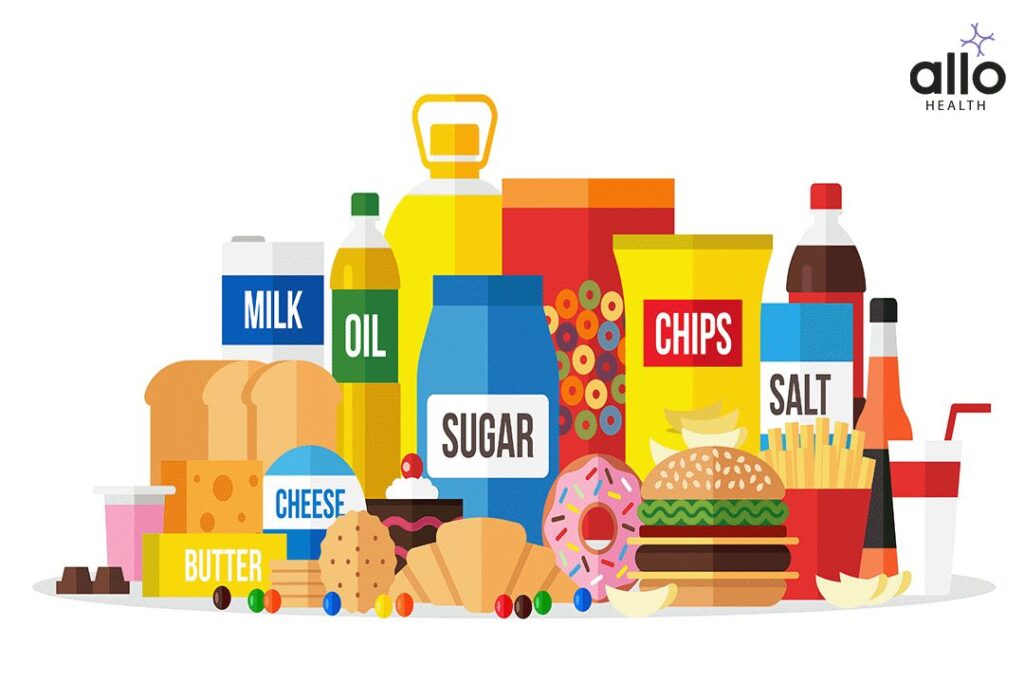Foods That Decrease Nitric Oxide Levels

Allo Health is dedicated to personalized well-being, offering support and trusted information tailored to individual health goals. The platform emphasizes human-generated content, led by a distinguished medical team of experts, including physicians and sexual health specialists. Their commitment to credibility involves rigorous fact-checking, authoritative research, and continuous updates to ensure accurate, up-to-date information. Allo Health's unique approach goes beyond conventional platforms, providing expert-led insights and a continuous commitment to excellence, with user feedback playing a crucial role in shaping the platform's authoritative voice.

A Psychotherapist with Clinical specialization, working for over seven years now. Areas of specialization range from Anxiety-related disorders, Mood-related disorders, Personality disorders, Sexual dysfunctions & other mental health issues.
Why This Was Upated?
Our experts continually monitor the health and wellness space, and we update our articles when new information became available.
Updated on 22 February, 2024
- Article was updated as part of our commitment to diversity, equity, and inclusion.

"The following blog article discusses food and diet-related information for general educational purposes. However, it is important to note that the information provided is not intended as personalized dietary advice and should not be considered a substitute for professional guidance from a registered dietitian or qualified healthcare professional. Before making any significant changes to your diet or nutrition plan, it is recommended to consult with a registered dietitian or healthcare professional.
Book consultation
Dietary changes can have a significant impact on your overall health and well-being. It is important to approach any changes to your diet in a balanced and sustainable manner, ensuring that you meet your nutritional needs and avoid any potential nutrient deficiencies. Rapid or extreme changes in dietary patterns can be detrimental to your health and may require professional guidance.
It is crucial to note that any specific dietary recommendations or guidelines mentioned in this article may not be appropriate for individuals with specific medical conditions, allergies, or intolerances. A registered dietitian or healthcare professional can provide individualized advice, including modifications or alternative food choices to accommodate your unique circumstances.
The information provided in this article may not encompass all possible dietary considerations or account for the latest research and nutritional guidelines."
Nitric oxide (NO) is a molecule that has a very important role to play in the human body. It acts as a signaling molecule, regulating various physiological processes such as blood flow, blood pressure, and the immune response.
Maintaining optimal levels of NO in the body is essential for good health and the prevention of various diseases.
In this article, we will discuss the importance of NO and the food items that can decrease the levels of this compound in the body. Furthermore, we will also look into some important functions of this molecule and how can one maintain the important processes in the body through proper nitric oxide intake.
Understanding The Importance of Nitric Oxide
One of the most important functions of NO is its role in regulating blood flow. When NO is produced, it diffuses into the surrounding tissues and binds to specific receptors on target cells. This binding triggers a cascade of events that leads to the relaxation of smooth muscle cells, which results in increased blood flow and decreased blood pressure.
The increased blood flow also helps to deliver oxygen and nutrients to the cells and tissues, which is essential for their proper functioning.
In addition to its role in regulating blood flow and blood pressure, NO also acts as an antioxidant and helps to protect against oxidative damage. This is important because oxidative damage can lead to the development of various diseases, such as cardiovascular disease, cancer, and neurodegenerative diseases.
By neutralizing free radicals and preventing oxidative damage, NO helps to maintain good health and prevent disease.
To maintain optimal levels of nitric oxide in the body, it is important to follow a healthy lifestyle and eat a balanced diet that is rich in nutrients. Some of the key nutrients that are important for nitric oxide synthesis include L-arginine, vitamins C and E, and the mineral magnesium. Foods that are rich in these nutrients include nuts, seeds, fruits, vegetables, and whole grains.
In addition to eating a balanced diet, regular exercise is also important for maintaining NO levels in the body. Exercise has been shown to increase NO production, which can help to improve blood flow, decrease blood pressure, and reduce the risk of cardiovascular disease.
It is recommended that you engage in regular physical activity for at least 30 minutes a day, most days of the week.
Another way to maintain NO content in the body is to avoid exposure to environmental toxins and pollutants. These toxins can interfere with nitric oxide synthesis and reduce its levels in the body. To minimize exposure, it is important to avoid smoking, limit your exposure to air pollution, and use natural and organic products whenever possible.
Benefits of Nitric Oxide In the Body
The importance of nitrate-rich foods cannot be underestimated for sure. There are so many beneficial effects of having an increased level of NO in the body. Here, in this section, we are going to talk about some of the most important benefits of increasing your dietary nitrate intake in order to increase the levels of NO in your body.
Nitric oxide (NO) is a gaseous molecule that plays a crucial role in various physiological processes in the human body. It is produced by the endothelial cells that line the inner walls of blood vessels and serves as a signaling molecule to regulate blood flow, blood pressure, and immune response.
- Regulates Blood Flow and Blood Pressure: The molecule acts as a vasodilator, which means it relaxes the smooth muscle cells in the walls of blood vessels and increases blood flow. This helps to lower blood pressure and prevent the formation of blood clots, which can lead to heart attacks and strokes. NO also helps to maintain the elasticity of blood vessels, which is important for avoiding any major cardiovascular risk.
- Supports Immune System: The production of this compound in the body has been shown to play a crucial role in the immune system by helping to fight off infections and regulate inflammation. It acts as an antimicrobial agent, killing bacteria, viruses, and other pathogens that can cause disease. It also helps to regulate the immune response and prevent excessive inflammation. So, a decrease in nitric oxide can cause damage to healthy tissues and lead to chronic diseases.
- Improves Exercise Performance: Nitric oxide synthesis increases during exercise, which helps to improve blood flow and oxygen delivery to the muscles. This can lead to improved exercise performance, increased endurance, and faster recovery after exercise. Additionally, nitric oxide has been shown to improve muscle function and reduce muscle fatigue, which can help to prevent injury and improve athletic performance.
- Enhances Sexual Function: The release of nitric oxide is important for sexual function in both men and women. It helps to increase blood flow to the genital area, leading to improved sexual arousal and satisfaction. In men, NO is involved in the regulation of erectile function, and low levels of NO have been linked to erectile dysfunction. In women, nitric oxide has been shown to play a role in vaginal lubrication and sexual arousal.
- Promotes Healthy Aging: As we age, our bodies produce less nitric oxide synthase, which can contribute to the development of age-related diseases such as cardiovascular disease, dementia, and osteoporosis. However, maintaining healthy levels of nitric oxide can help to prevent these diseases and promote healthy ageing.
- Supports Brain Function: Nitric oxide production has been shown to play a crucial role in brain function, including learning, memory, and mood regulation. It helps to improve blood flow and oxygen delivery to the brain, which can enhance cognitive function and prevent age-related cognitive decline. Additionally, nitric oxide has been shown to have a positive effect on mood and mental health, and low levels of NO have been linked to depression and anxiety.
To sum up, nitric oxide is a crucial molecule that plays a vital role in maintaining good health. From regulating blood flow and blood pressure to supporting the immune system and promoting healthy ageing, nitric oxide has far-reaching effects on the human body.
By maintaining healthy levels of nitric oxide, we can improve our overall health and prevent the development of age-related diseases.
Health Problems Caused By Decreased Nitric Oxide Levels

There are so many negative health effects to decreased levels of NO in the body. Let us have a look at some of the health conditions you might be battling if you don’t have the required levels of nitrates in the body.
- Cardiovascular disease: NO is a molecule that helps regulate blood flow and blood pressure. It acts as a vasodilator, relaxing the smooth muscle in the walls of blood vessels, which helps to increase blood flow and reduce blood pressure. Decreased nitric oxide levels can lead to constricted blood vessels and increased blood pressure, increasing the risk of heart disease and stroke.
- Erectile dysfunction: Nitric oxide is important for maintaining an erection, as it helps to increase blood flow to the penis. Decreased nitric oxide levels can lead to reduced blood flow and difficulty achieving or maintaining an erection. This can have a significant impact on the quality of life and sexual relationships.
- Inflammation: NO helps regulate inflammation in the body, and decreased levels can lead to increased inflammation. Chronic inflammation has been linked to several health problems, including heart disease, cancer, and autoimmune disorders.
- Cognitive decline: Nitric oxide is involved in brain function and communication between brain cells. It helps regulate blood flow to the brain and contributes to the formation of new memories. Decreased nitric oxide levels can contribute to cognitive decline and the development of neurodegenerative diseases such as Alzheimer’s and Parkinson’s.
- Migraines: Nitric oxide plays a role in regulating blood flow in the brain, and low levels can lead to migraines. Migraines are severe headaches that are often accompanied by nausea, sensitivity to light and sound, and visual disturbances.
- Chronic obstructive pulmonary disease (COPD): NO helps regulate breathing, and decreased levels can worsen symptoms in people with COPD. COPD is a chronic lung disease that makes it difficult to breathe and can lead to respiratory failure.
- Type 2 diabetes: Low levels of nitric oxide can contribute to insulin resistance and the development of type 2 diabetes. Insulin resistance occurs when the body’s cells become less sensitive to insulin, and the pancreas has to produce more insulin to control blood sugar levels. Over time, the pancreas can become exhausted, leading to high blood sugar levels and the development of type 2 diabetes.
So, decreased nitric oxide levels can have a significant impact on overall health and well-being. It is important to maintain healthy levels of this molecule through a combination of diet, exercise, and lifestyle changes. In some cases, supplementing with NO precursors may also be beneficial.
Foods That Decrease Nitric Oxide Content In the Body
Maintaining a healthy diet is more than important to achieve all the health benefits. There are different food items that help in building NO in the body. However, along with that, you might also find some food items that can deplete the concentration of nitric oxide. So, in case you want to ensure overall good health and proper nitric oxide content in your body, there is no doubt that you need to steer clear of these food items.
Processed Foods
Processed foods are often high in salt, sugar, and unhealthy fats, which can decrease nitric oxide levels and contribute to the development of cardiovascular disease. Salt intake can increase blood pressure, which can lead to damage to the blood vessels, reducing the ability of the body to produce NO.
Additionally, high sugar intake can lead to insulin resistance, which can decrease nitric oxide levels and contribute to the development of cardiovascular disease. Unhealthy fats, such as trans-fats, can increase inflammation in the body and decrease nitric oxide levels.
Saturated Fats
Saturated fats, commonly found in meat, dairy products, and processed snacks, can decrease NO levels and can negatively impact the cardio vascular function of the body. Saturated fats can increase inflammation in the body and contribute to the development of plaque in the arteries, which can restrict blood flow and can impact the production of NO.
Additionally, saturated fats can increase cholesterol levels, which can contribute to the development of cardiovascular disease.
Alcohol

Excessive alcohol consumption can decrease NO levels and damage blood vessels, leading to decreased blood flow and increased blood pressure. Alcohol can also increase inflammation in the body and contribute to oxidative damage, both of which can decrease nitric oxide levels. Additionally, alcohol can interfere with the body’s ability to absorb vitamins and minerals, such as vitamins C and E, which are important for maintaining healthy nitric oxide levels.
Caffeine
While moderate caffeine consumption has been shown to increase nitric oxide levels, excessive caffeine consumption can have the opposite effect. Caffeine can increase blood pressure and interfere with the body’s ability to produce nitric oxide, leading to decreased blood flow and increased systolic blood pressure.
Additionally, excessive caffeine consumption can lead to dehydration, which can further decrease the production of nitric oxide.
Refined Carbohydrates
Refined carbohydrates, such as white bread and sugary snacks, can promote inflammation in the body and deplete the levels of the compound as well. Inflammation can restrict blood flow and decrease the body’s ability to produce NO, leading to decreased blood flow and increased blood pressure.
Additionally, refined carbohydrates can increase insulin resistance, which also leads to a decrease in the levels of NO and might lead to different problems related to heart health.
Processed Oils
Processed oils, such as vegetable oil and margarine, can also promote inflammation which will ultimately lead to a decrease in the production of nitric oxide. Processed oils are high in unhealthy fats, such as trans-fats, which are extremely harmful to the body as well as the production of nitric oxide.
Additionally, processed oils can increase cholesterol levels, which can contribute to a negative impact on cardiovascular health.
Vitamin and Mineral Deficiencies
Deficiencies in vitamins and minerals, such as vitamin C, vitamin E, and magnesium, can decrease nitric oxide levels and contribute to the development of cardiovascular disease and other health problems.
Vitamins C (found in citrus fruits) and vitamin E are antioxidants that help to protect against oxidative damage, while magnesium is important for maintaining healthy blood pressure and blood flow. Deficiencies in these vitamins and minerals can decrease the body’s ability to produce nitric oxide and contribute to the development of cardiovascular disease.
Hence, it is important to be mindful of foods that have a negative impact on the NO content of the body and can impact your health in a negative manner.
As per human studies, processed foods, saturated fats, alcohol, excessive caffeine, refined carbohydrates, processed oils, and vitamin and mineral deficiencies and often considered to be the main causes of the decrease of NO in the body.
Nitric Oxide production is seemingly essential for maintaining good health and improving the different processes and functions in the body. If you follow the right diet and include important lifestyle changes, there is a very high chance that you might be able to experience an increase in the levels of NO molecules in your body.
Make sure that you include leafy greens, fatty acids, and other important sources of nitrates in your diet to have the best benefits.
Final Words:
- Nitric oxide (NO) plays a crucial role in regulating blood flow, blood pressure, and immune response.
- Maintaining optimal NO levels is vital for good health, as it acts as an antioxidant, supports the immune system, and improves exercise performance and sexual function.
- To maintain NO levels, a balanced diet rich in nutrients like L-arginine, vitamins C and E, and magnesium, regular exercise, and avoiding environmental toxins are essential.
- Decreased NO levels can lead to cardiovascular disease, erectile dysfunction, inflammation, cognitive decline, migraines, COPD, and type 2 diabetes.
- Foods that decrease NO levels include processed foods, saturated fats, alcohol, excessive caffeine, refined carbohydrates, processed oils, and vitamin and mineral deficiencies.
- To ensure good health and proper NO content, one should steer clear of these harmful food items and focus on a diet rich in nitrate sources like leafy greens and fatty acids.
Frequently Asked Questions
Q: What is nitric oxide, and why is it important?
A: Nitric oxide (NO) is a molecule naturally produced by the body that plays a crucial role in various physiological processes. It acts as a vasodilator, meaning it relaxes and widens blood vessels, which improves blood flow and circulation. Nitric oxide is essential for cardiovascular health, immune function, and nervous system regulation.
Q: Which foods can decrease nitric oxide levels in the body?
A: Certain foods can potentially decrease nitric oxide levels. These foods often contain compounds that interfere with the production or action of nitric oxide. Common examples include foods high in saturated fats, processed sugars, and certain antioxidants.
Q: Can supplements help maintain healthy nitric oxide levels?
A: Some dietary supplements, such as L-citrulline or nitrate supplements derived from beetroot, have been shown to support nitric oxide production. However, it’s essential to consult with a healthcare professional before starting any supplementation to ensure it’s safe and suitable for your specific health needs.







































